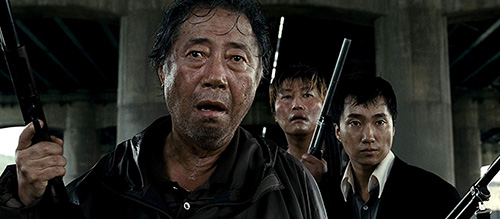The Host (2006) Review
This article was originally published to SSP Thinks Film by Sam Sewell-Peterson.
The Host (2006)
Director: Bong Joon-ho
Screenwriters: Bong Joon-ho, Ha Won-jun, Baek Chul-hyun
Starring: Song Kang-ho, Byun Hee-bong, Park Hae-il, Bae Doona, Ko Ah-sung
To shamelessly appropriate and warp the catchphrase of a beloved cartoon character, The Host is smarter than the average monster movie.
I stumbled across this one on DVD years back, and it’s since become a firm favourite along with the rest of genre auteur Bong Joon-ho’s oeuvre. My affection for the film is not for the monster, as good as it is, but because of the very odd but very real family’s quest for healing, as well their need to stay together.
When a monster emerges from the Han river and takes their youngest member, the Park family must stop squabbling long enough to find it and bring their dysfunctional unit together again. But the Korean government and some shady American scientists are up to something and lock down Seoul to prevent unwanted snooping…
As is common with monster movies from Godzilla onwards, the creature itself (in this case a newt-dolphin-garbage crusher thing) is not the biggest threat to our heroes, rather it stands in for a greater evil of society: this time it’s the corruption of the Korean state-run institutions and the morally questionable invasive interference by the USA in Korean affairs.
Writer/director Bong not only made The Host a smart and entertaining thriller, but a tender family drama and a rip-roaring comedy. The hilariously dysfunctional Park family are all great characters, and you can really empathise with their plight as they frantically search for their youngest, Hyun-seo (Ko Ah-sung) who has been taken by the monster.
Song Kang-ho makes a compelling central protagonist, and makes the perpetually napping failure Gang-doo a comical but tragic reluctant hero. Here he is reunited with fellow regular Bong Joon-ho collaborators Byeon Hee-bong, Park Hae-il and Bae Doona playing the rest of the constantly bickering Park family. Their squabbles and ever-increasing desperation in failing to find Hyun-seo, though undeniably poignant, also provide plenty of opportunity for humour.
Bong is a true master of black comedy, extremely skilled at getting a laugh out of the most unexpected situation. In The Host, there’s a scene where the Parks gather around the shrine for the dead and missing post-monster attack. In most films, this scene would be a solemn one, but here Bong uses the family’s extreme reaction to their plight, the unanimous blame of Gang-doo for the accidental loss of his daughter, and the insults the family can’t resist trading with each other for their various shortcomings (“Look Hyun-seo, your aunt brought you a bronze medal!”) to provide the funniest moment of the film. It’s a perfect balance of tone, of the dark and the light, of tragedy and comedy, as the Park family clumsily grapple with each other in their hysteria and collapse, wailing on the floor.
The more restrained, emotionally raw moments in the film are nuanced and affecting, particularly the lip-wobbling moment when the family patriarch Hee-bong finally opens up to his children and confesses how much he truly cares for his eldest son Gang-doo while said son is apparently fast asleep. The action works well on its own terms too, with the CGI holding up remarkably well considering the film’s modest budget, and every set piece driven first and foremost by where the characters find themselves in their respective arcs.
Bong Joon-ho continually pushes boundaries and challenges genre filmmaking conventions, but never loses sight of what really matters – character, above all else. You’d have to be a complete moron to dismiss The Host as just another dumb creature feature. It’s sharp and layered, grounded and very much about this world and real human experiences despite its sci-fi trappings. I’m so grateful to this film for introducing me to Bong’s filmography, that of one of the world’s most vital cinematic voices of our contemporary age.
22/24


